
The Archimedes' screw, also known as the Archimedean screw, hydrodynamic screw, water screw or Egyptian screw, is one of the earliest hydraulic machines. Using Archimedes screws as water pumps dates back many centuries. As a machine used for lifting water from a low-lying body of water into irrigation ditches, water is lifted by turning a screw-shaped surface inside a pipe. In the modern world, Archimedes screw pumps are widely used in wastewater treatment plants and for dewatering low-lying regions. Run in reverse, Archimedes screw turbines act as a new form of small hydroelectric powerplant that can be applied even in low head sites. Such generators operate in a wide range of flows and heads, including low heads and moderate flow rates that is not ideal for traditional turbines and not occupied by high performance technologies. The Archimedes screw is a reversible hydraulic machine, and there are several examples of Archimedes screw installations where the screw can operate at different times as either pump or generator, depending on needs for power and watercourse flow.

Shelby Charter Township, officially the Charter Township of Shelby, is a charter township located in Macomb County in the U.S. state of Michigan. The township is an affluent northern suburb of Detroit. As of the 2020 census, the population was 79,408, up from 73,804 in 2010. Shelby Charter Township is one of the fastest-growing communities in Metro Detroit.

The Clinton–Kalamazoo Canal is a canal in Michigan that was abandoned after being only partially completed. The canal was to connect Lake St. Clair with Lake Michigan. Project backers were inspired by the success of the Erie Canal in New York, which was completed in 1825. After gaining statehood in 1837, Michigan elected its first governor, Stevens Thomson Mason, who initiated an ambitious program of internal improvements, including three railroads and two canals. On March 21, 1837, the Legislature authorized Governor Mason to contract a loan for the construction of the canal from Mt. Clemens to Rochester, a railroad from Shelby to Detroit, a railroad from Detroit across the State and a railroad from Port Huron into the interior, to be known as the Port Huron & Grand River road. In the spring of 1838, a Board of Commissioners composed of seven men, was appointed to take charge of the canal work.

Apple cider is the name used in the United States and Canada for an unfiltered, unsweetened, non-alcoholic beverage made from apples. Though typically referred to simply as "cider" in North America, it is not to be confused with the alcoholic beverage known as cider in other places, which is called "hard cider" in the US. Outside of the United States and Canada, it is commonly referred to as cloudy apple juice to distinguish it from clearer, filtered apple juice and hard cider.

Pomace, or marc, is the solid remains of grapes, olives, or other fruit after pressing for juice or oil. It contains the skins, pulp, seeds, and stems of the fruit.
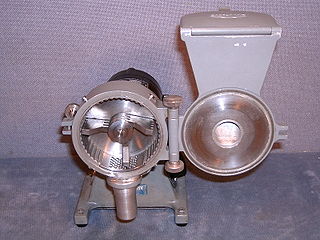
A mill is a device, often a structure, machine or kitchen appliance, that breaks solid materials into smaller pieces by grinding, crushing, or cutting. Such comminution is an important unit operation in many processes. There are many different types of mills and many types of materials processed in them. Historically mills were powered by hand or by animals, working animal, wind (windmill) or water (watermill). In modern era, they are usually powered by electricity.
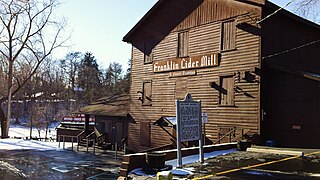
The Franklin Cider Mill, known previously as the Franklin Grist Mill, is a cider mill located in Franklin, Michigan.

A silo is a structure for storing bulk materials.

Mapledurham Watermill is a historic watermill in the civil parish of Mapledurham in the English county of Oxfordshire. It is driven by the head of water created by Mapledurham Lock and Weir, on the River Thames. The mill was built in the 15th century, and further extended in the 17th, 18th and 19th centuries. It is a Grade II* listed building and is preserved in an operational state.

A screw conveyor or auger conveyor is a mechanism that uses a rotating helical screw blade, called a "flighting", usually within a tube, to move liquid or granular materials. They are used in many bulk handling industries. Screw conveyors in modern industry are often used horizontally or at a slight incline as an efficient way to move semi-solid materials, including food waste, wood chips, aggregates, cereal grains, animal feed, boiler ash, meat, bone meal, municipal solid waste, and many others. The first type of screw conveyor was the Archimedes' screw, used since ancient times to pump irrigation water.
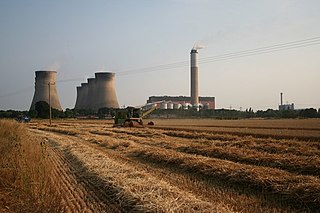
Cottam power station is a decommissioned coal-fired power station. The site extends over 620 acres (250 ha) of mainly arable land and is situated at the eastern edge of Nottinghamshire on the west bank of the River Trent at Cottam near Retford. The larger coal-fired station was decommissioned by EDF Energy in 2019 in line with the UK's goal to meet its zero-coal power generation by 2025. The smaller in-use station is Cottam Development Centre, a combined cycle gas turbine plant commissioned in 1999, with a generating capacity of 440 MW. This plant is owned by Uniper.

A sagardotegi is a type of cider house found in the Basque Country where Basque cider and traditional foods such as cod omelettes are served. Modern sagardotegis can broadly be described as a cross between a steakhouse and a cider house.

Gladden Windmill is an historic windmill formerly located on Pigeon Valley Road in Napoli, Cattaraugus County, New York. The windmill was built in 1890 and is a well-preserved example of a vertical wind turbine built during the 19th century. Although no longer operational, the turbine is a rare example of wind power technology in the United States.

High Marnham Power Station was a coal fuelled power station in Nottinghamshire, to the west of the River Trent, approximately 0.5 miles (0.8 km) north of the village of High Marnham. Construction site clearance began in November 1955, No. 1 Unit power generation commenced in October 1959, and the station became fully operational in June 1962. The plant operated until 2003 when it was decommissioned, though the cooling towers weren't demolished until 2012.

A cider mill, also known as a cidery, is the location and equipment used to crush apples into apple juice for use in making apple cider, hard cider, applejack, apple wine, pectin and other products derived from apples. More specifically, it refers to a device used to crush or grind apples as part of the overall juice production.
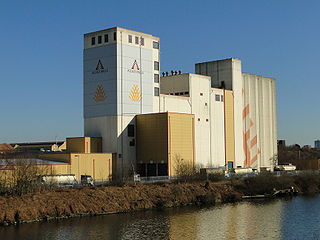
A gristmill grinds cereal grain into flour and middlings. The term can refer to either the grinding mechanism or the building that holds it. Grist is grain that has been separated from its chaff in preparation for grinding.

A screw turbine is water turbine that converts the potential energy of water on an upstream level into work. This hydropower converter is driven by the weight of water, similar to water wheels, and can be considered as a quasi-static pressure machine. Archimedes screw generators operate in a wide range of flows and heads, including low heads and moderate flow rates that are not ideal for traditional turbines and not occupied by high performance technologies.
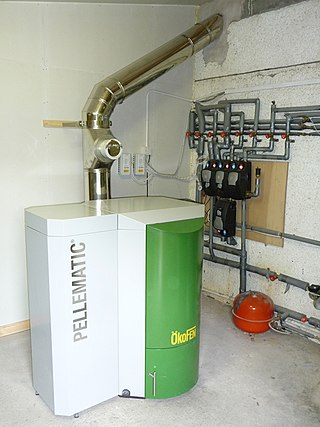
A pellet boiler is a heating system that burns wood pellets. Pellet boilers are used in central heating systems for heat requirements from 3.9 kW (kilowatt) to 1 MW (megawatt) or more. Pellet central heating systems are used in single family homes, and in larger residential, commercial, or institutional applications. Pellet boiler systems run most efficiently at full load and can usually be regulated down to 30% of full load. Since the warm up phase of pellet boilers usually takes longer than for oil or gas firing systems, short burning phases have negative effects on the fuel efficiency. In order to improve energy efficiency and reduce harmful emissions, pellet boilers are usually combined with buffer systems, such as insulated water tanks.

Steele Creek is a river in Herkimer County in the state of New York. The creek begins in an unnamed swamp south of Cedarville, and flows in a northeast direction before emptying into the Mohawk River in the village of Ilion. Steele Creek travels through the Ilion Gorge and alongside NY-51 for most of its length. Steele Creek derives its name from Rudolph Stahl, who built the first grist mill in Ilion along the creek.
B.F. Clyde's Cider Mill is a historic cider mill located in Mystic, Connecticut. It is the oldest and only surviving steam powered cider mill in the United States. It is also the oldest continuous producer of hard cider in the United States.




















